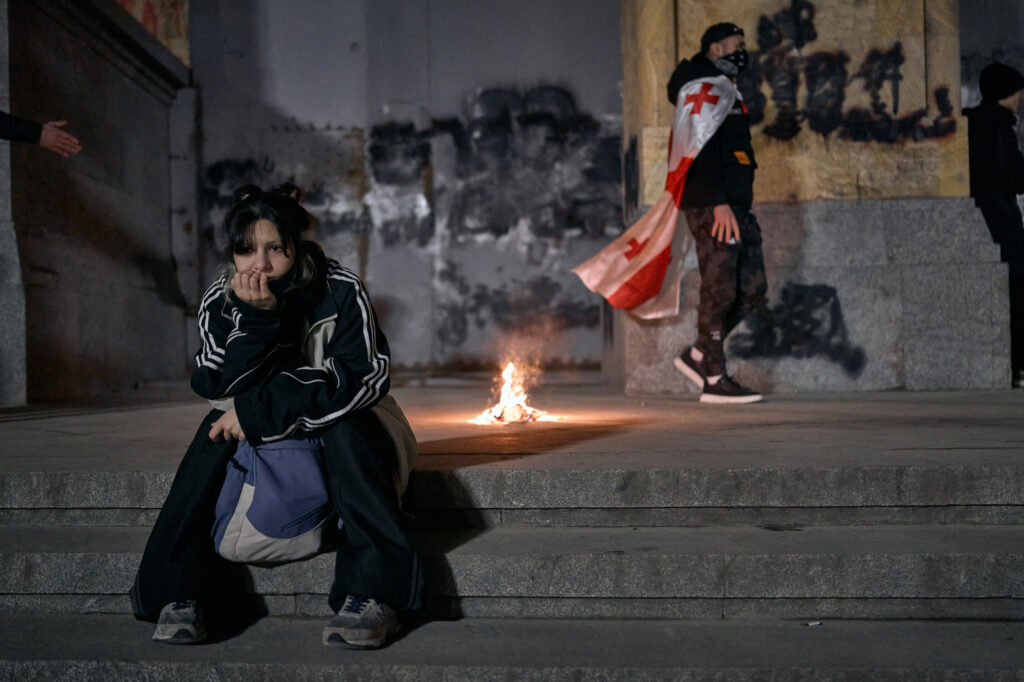Georgian Straits

Georgia has been enmeshed in a political crisis for a year, with large public demonstrations, crackdowns by the ruling Georgian Dream party, and condemnations of the GD’s growing illiberalism from leaders throughout North America and Europe. And now, under the Trump administration, the U.S. government is disengaging, raising fears that the Georgian democracy movement is losing one of its staunchest supporters.
These concerns are real, but they do not tell the whole story. I have seen up close, and in a small way have been part of, Georgia’s political evolution for more than two decades, and I think many observers misunderstand two of its essential features, which clouds their assessments of what has happened there and what might happen next. Although repression might be harsher today than it has been in the past, it also is one leitmotif in a broader recurrent pattern. And, unfortunately, local demand for democracy in Georgia has long been less organic, or indigenous, than many outsiders choose to believe.
A full understanding of the country’s current turmoil requires re-examining its political history since the fall of the USSR. Georgia’s post-Soviet political trajectory has been defined by a cycle that goes something like this: A democratic breakthrough occurs, followed by incomplete democratic consolidation, followed by an authoritarian turn, followed by an effort to consolidate a semi-authoritarian regime, followed by the regime’s collapse, followed by another democratic breakthrough. And repeat.
But this cycle has frequently been obscured by larger-than-life figures, such as Bidzina Ivanishvili, the reclusive billionaire who founded the GD and remains the de facto leader of Georgia; the former president Mikheil Saakashvili; and Saakashvili’s predecessor, Eduard Shevardnadze. Similarly, the impressive patina of elite English-speaking civil society in Tbilisi conceals a more complex reality than many in the West might want to believe about the Georgian people, their demand for democracy, and their attitudes toward Europe and the West.
As Georgia’s current crisis persists, a narrative has emerged that, like most narratives, includes elements of truth as well as oversimplifications. In this telling, the GD government, led by the quirky and authoritarian pro-Moscow Ivanishvili, picked a fight with the country’s pro-Western majority, partly by introducing a Russia-inspired so-called foreign agents bill in the spring of 2023, which it then wisely decided to withdraw, only to re-introduce it a year later. The government responded to protests opposing the proposed legislation with arrests and beatings and by harassing the opposition. The bill—which called for organizations receiving foreign funding to register as foreign agents and for imposing on them onerous registration and reporting requirements—was nonetheless passed by parliament and then signed into law in June 2024.
The GD also committed widespread fraud in the October 2024 election, installed a drab loyalist as a figurehead president, and in the face of more protests, responded with an even more brutal crackdown. Because of all this, the GD seems to have cast its lot with the Putin-Orbán-Trump grouping and against liberalism and democracy. As further evidence of this connection some point out that after the foreign agents bill was momentarily withdrawn in early 2023, Irakli Garibashvili, then the prime minister, spoke in Budapest at the Conservative Political Action Conference, a key node in the transnational fascist movement. More recently, the GD welcomed Trump’s victory last November.
Implicit in this account is the view that the GD has always been pro-Moscow and so is not fully legitimate; that the United National Movement (UNM), which governed Georgia from 2004 to 2012, was more democratic, more popular, and so more legitimate; and that the Georgian people have long had a strong desire to be fully integrated into Europe and NATO. Again, the flaw in this narrative isn’t so much that it’s wrong, although much of it is, but rather that it’s radically incomplete and therefore misleading.
The ur-misunderstanding of contemporary Georgian politics has little to do with the GD or Ivanishvili. Rather it lies with a misreading—perhaps a deliberate one—of the UNM period on the part of many in the West. During 2004–12, Georgia was governed by the UNM and power was highly concentrated in the person of its leader, Saakashvili, the president for almost all of that period. Misha, as he was almost universally known, is now languishing in a Georgian prison and increasingly fading into history. But during those years he defined Georgia to the rest of the world, particularly the U.S.
Saakashvili’s Georgia was aggressively pro-Western and pro-American. And during the days of the neoconservative ascendancy in the U.S., Saakashvili cast his lot with the administration of George W. Bush. He became a darling of the U.S. foreign policy establishment. He sent Georgian troops to Afghanistan and Iraq. He pursued libertarian economic policies at home (overlaid with high-level cronyism and corruption). This earned him many friends in the West, particularly, but not only, on the right. Saakashvili also made it clear that Georgia wanted to be part of NATO and the EU, and he consistently promised the Georgian people that membership in both those organizations was just around the corner—a promise that was deliberately misleading since NATO and EU officials always made it clear to Georgia that gaining membership in those organizations would be a lengthy process.
I was chief of party in Georgia for the National Democratic Institute (NDI) from 2002 to 2004, and in that capacity, I helped Saakashvili ascend to power: I advised him and others on strategy and coordinated a handful of activities that led up to the Rose Revolution of 2003–04, the nonviolent pro-democracy protests that brought down Shevardnadze. But I soon became appalled at Saakashvili’s increasingly undemocratic tendencies, as well as how those were being overlooked in Washington; many of those observers’ knowledge and experience of Georgia could charitably be described as surface level.
The UNM, in general, and Saakashvili, in particular, were relentless in their courtship of Western politicians, journalists, and others working on the Caucasus. The UNM seemed to view the Georgia-policy community, especially in the U.S., as an important part of its political base. In addition to Saakashvili’s fluency in English and his considerable charisma and charm, which he deployed in countless personal meetings, speeches, and small briefings, the UNM made efforts to influence elite Western opinion on Georgia, including by spending substantial sums of money on lobbyists and frequently bringing journalists and others to Georgia for the full wine, khachapuri, and political-spin experience.
After the Rose Revolution, Saakashvili made some initial moves toward strengthening Georgia’s democracy. But by late 2007 that experiment was over. Between 2007 and 2012, Georgia moved in a distinctly authoritarian direction. Opposition political forces were harassed; the UNM consolidated its control over almost every aspect of political life; media freedoms were curtailed; and the judiciary was not, in any meaningful way, independent. Yet the UNM, thanks largely to its well-financed and effective public relations efforts, remained very well-liked and supported in the West. Both in my writings and in meetings in Washington during the late UNM period, I raised my concerns about the UNM slipping further into semi-authoritarianism. Georgian opposition figures visiting New York frequently found their way to me, but until Ivanishvili decided to enter politics in late 2011, they felt they had little power.
A gulf was widening between how the Georgian government was seen in Washington and how it was seen by the Georgian people. Even as the UNM government became increasingly unpopular in Georgia, support for it remained strong in many Western capitals, none more so than Washington, particularly on the right. During those years, academics and other students of Georgia began to perceive the problems of democracy there, but foreign policymakers too frequently overlooked them: The Georgia I was seeing and discussing then with activists on the ground was very different from the Georgia that people in the Beltway believed existed. That gap continued to distort Western understandings of Georgian through much of the period of GD rule.
And so when in October 2012 the GD defeated the UNM in a parliamentary election, thus wresting power away from Saakashvili’s party, many in the U.S. didn’t understand the event as the democratic breakthrough that it was. The UNM lost that election because its authoritarian direction, its failure to deliver on its economic promises, and, as was revealed a few weeks before the election, the widespread torture of prisoners, were wildly unpopular among the Georgian people. And yet official and unofficial Washington was largely in denial about much of the UNM’s wrongdoing.
In the earliest days of the GD’s rule, many in Washington never seemed to recognize what most Georgians understood: that the GD had peacefully and democratically dislodged a regime that had become unmoored and had betrayed its promises. As one GD official told me during a trip to the U.S. in early 2013, Washington saw the GD victory more as a coup than a democratic breakthrough. This was evident in many Western officials’ reaction to the arrests and prosecution of UNM leaders following the GD victory. For many outside Georgia, this seemed like a clear case of politically motivated prosecution—or “lawfare,” in the MAGA parlance of today. Yet many in Georgia (other than the most loyal UNM supporters) simply considered this to be justice and an abusive regime being held accountable.
This initial misappreciation of the GD in the West has been more damaging, particularly to the U.S.-Georgia relationship, than many in the U.S. understood at the time or have realized since. It would probably be an overstatement to claim that the GD would have moved in a completely different direction than it did if the U.S. had treated it differently from the beginning, but that possibility cannot simply be dismissed. The other important and related fact is that the UNM stopped being a force for democracy relatively early in its rule and that it remains widely disliked by the Georgian people. One of the reasons the current protests are so large and enduring is that, unlike most other protest movements during the GD period, they are led primarily by civil society rather than people associated with the UNM.
The crisis in Georgia can only be fully understood by simultaneously keeping in mind several distinctly different ideas: The GD has become, by any measure, another nasty authoritarian government, which looks a lot more Putinist than democratic; the UNM is by now a busted political valise at best; and the West, particularly the U.S., by initially mishandling relations with the GD, has contributed to the ruling party’s repressive turn.
These three ideas are not mutually exclusive, and together they give the lie to more reductive narratives. The GD has not, despite what the UNM has long said, always been a Russian political project. In fact, the coalition that Ivanishvili assembled in 2012 included some of the strongest pro-West and pro-Washington voices in Georgia, including Irakli Alasania, Tedo Japaridze, Tinatin Khidasheli, Giorgi Margvelashvili, and David Usupashvili. All went on to hold powerful positions in government or parliament in the early years of the GD, with Margvelashvili serving as Georgia’s president from 2013 to 2018. But all either resigned or were sidelined as the GD abandoned its initial democratic promise.
I, too, was a supporter of the GD back in 2012, and I offered the party informal advice at the time, because I believed that continued UNM rule would lead Georgia to become like its authoritarian neighbor Azerbaijan, albeit with better food and wine. Since then, like many of my Georgian friends and colleagues who backed the GD early on, I was pushed away from the party and I have frequently questioned my decision to ever support it, even as I have remained acutely aware of the danger that a return to UNM governance would pose for Georgia.
The GD, like the UNM before it, has a political outlook that is grounded in the character and views of its leader. Ivanishvili, as the UNM frequently points out, made much of his fortune in Russia, but he is also, in his own way, a Georgian patriot. For example, nobody has donated more money to various Georgian cultural and philanthropic causes. During the early UNM era, before his falling out with Saakashvili, Ivanishvili provided significant financial support to the UNM-led government. But it is also the case that Ivanishvili is Homo Sovieticus: His vision for Georgia is based on his being a product of the Soviet Union and the years that followed its demise. He has no particular regard for democracy; he sees it as a way to secure power, as he did in 2012.
I have spent a lot of time with both Ivanishvili and Saakashvili, and the latter’s interest in and knowledge about the West, particularly the U.S., was immeasurably greater. Ivanishvili seemed strikingly incurious about the U.S., although he occasionally asked me questions about, of all things, baseball. Ivanishvili still considers Moscow, not Washington nor Brussels, to be the most powerful external actor in Georgia’s political life. For him, a Georgia free of Russian influence, whether he or anybody else wants that, is simply unimaginable. For example, one factor driving Georgia’s conduct in the early phases of Russia’s full-scale invasion of Ukraine in 2022 was Ivanishvili’s view that Russia would inevitably win the war. For Ivanishvili, to go all in with Kyiv and its backers would simply be to back the wrong horse.
The UNM has criticized Ivanishvili’s “informal rule”—an awkward term that the opposition adopted to describe the power the billionaire wields despite at times holding no formal office—is completely accurate, and perhaps even understated. But during the UNM regime, political power also emanated from the person of Saakashvili. He, unlike Ivanishvili, was president most of the time, but under both administrations, institutions such as parliament mattered a lot less than whatever the paramount leader wanted; titles and formal positions were less important than simply having the leader’s ear. For almost the entire period since the Rose Revolution of 2003–04, Georgia has been subject to the caprice of one of two individuals on whom very few structural limits were imposed.
Another very different but also misguided narrative has emerged among the UNM’s strongest critics. For some on the far left, everything the GD does is a reaction to both the UNM’s authoritarian excess and, implicitly, its role in the global neoconservative imperialist project. As with so many takes on Georgia’s politics, there is a kernel of truth to this one. The UNM was a darling of the George W. Bush–era far right, and the revisionist history of the UNM’s years in power has put democratic lipstick on a semi-authoritarian pig. This narrative provides a genuine and important criticism of U.S. work in the region, but it comes too close to reducing the GD to little more than a reaction to Western imperialism.
And now, over the course of a few short months, the Trump administration’s own tilt toward authoritarianism and its efforts to deconstruct the American state, particularly in the area of foreign policy, has deepened Georgia’s political crisis. The dismantling of USAID has gutted the democracy movement in Georgia. But that reality also underscores the extent to which the demand for democracy (or for joining the EU) has never been deeply organic in Georgia. Although it would be incorrect to assert that the U.S. and its allies have sought to impose democracy on Georgia, it is accurate to note that much of the energy and money behind the demand for democracy there was exogenous.
The absence today of a U.S.-led, and U.S.-funded, push for democracy will make it much easier for the GD to consolidate its grip on power. And this means that it is possible the GD will succeed in breaking, or at least significantly stretching out, the traditional post-Soviet cycle of Georgian politics.
Western critics of the GD might wring their hands in frustration, but they (we) must also recognize that even after three decades since the Soviet period, the Georgian democracy movement is still heavily dependent on the West. The more difficult questions with which to reckon are: To what extent is that fact the result of a deliberate strategy on the part of the West, and to what extent has democracy work in Georgia primarily been an assertion of European and American power? My sense is that policymakers in the U.S. and Europe didn’t set out to make Georgia’s democracy activists dependent on the West, but it was always easier for them to ignore how the asymmetry of wealth and power in Georgia favored their views than to take on the hard work of trying to break that dependence.
Georgia’s path forward will be very difficult. The GD can no longer be described as anything other than an authoritarian government. Its leader, Ivanishvili, has let his worst political instincts, paranoia, and megalomania steer Georgia in a terrible direction, from which it may take years to recover. Meanwhile, without U.S. financial and political support, democratic forces on the ground will be much weaker, and it isn’t yet clear whether pressure from European countries can fill that political gap.
There are two likely outcomes for Georgia. The first is a successful consolidation of a GD-led regime that becomes more authoritarian, with decreasing space for freedoms of speech and expression—that’s the Belarus-on-the-Black-Sea scenario that so many Georgians fear. The second likely outcome is a period of prolonged low- to mid-level instability. The opposition currently is not strong enough to bring down the GD regime, but it may be strong enough to consistently disrupt political, social, and economic life in Georgia.
It would be easy to place all the blame for this on Ivanishvili and nefarious plans emanating from Moscow. Even if that is part of the story, it is not the whole story. American policymakers, academics, and kibitzers should have enough self-awareness to recognize that their misreading of both the late UNM period and the early GD period facilitated, or at the very least accelerated, the GD’s slide to authoritarianism. This may be difficult for some to accept, not least because of the personal relationships that the UNM has cultivated with American policy elites, but it is the only way to properly understand what is happening in Georgia today.
Lincoln Mitchell teaches in the School of International and Public Affairs at Columbia University.


